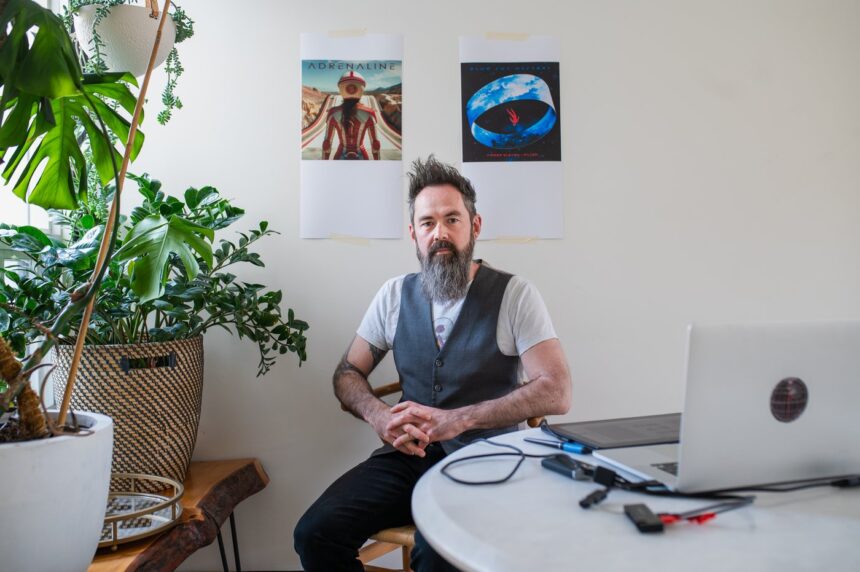In the shadow of Toronto’s iconic CN Tower, a creative revolution is brewing that has local album cover designers questioning their future. The controversy centers on local indie musician Alex Novak, whose latest EP features AI-generated cover art that bears striking similarities to the work of celebrated Toronto illustrator Marta Chen.
“I spent fifteen years developing my signature style,” Chen told me during our meeting at her Queen West studio. “To see it replicated by an algorithm in seconds is both fascinating and terrifying.”
The incident highlights growing tensions in Toronto’s creative community, where AI tools are simultaneously offering new possibilities while threatening established artistic livelihoods. According to a recent survey by the Toronto Arts Council, nearly 47% of local visual artists now report competing with AI-generated work.
Novak defends his choice, explaining that limited budgets forced his hand. “As an independent musician, I can’t afford to commission original artwork for every release,” he said. “AI allows me to create professional-looking visuals that would otherwise be out of reach.”
This practical reality resonates with many emerging artists in the city. Toronto-based music producer Javier Rodriguez notes that production costs have risen dramatically while streaming revenue remains minimal. “The math doesn’t work anymore,” Rodriguez explained during our conversation at Kensington Market’s Moonbean Coffee. “Something has to give, and often it’s the budget for visual art.”
The legal landscape remains murky. Copyright law hasn’t caught up with AI’s ability to learn from and synthesize existing works. The City of Toronto’s Cultural Division recently hosted a panel discussion addressing these concerns, but concrete solutions remain elusive.
“We’re in uncharted territory,” said Priya Sharma, an intellectual property lawyer with the Toronto-based firm Henderson & Associates. “Current copyright frameworks weren’t designed for AI systems that ‘learn’ from existing creative works.”
For established designers like Chen, the controversy goes beyond legal questions to the heart of artistic identity. “My work reflects years of experimentation, cultural influences, and personal expression,” she said. “AI can mimic the aesthetic result, but not the human journey behind it.”
The debate has sparked creative responses within Toronto’s arts community. At the recent “Human vs. Machine” exhibition at the Power Plant Contemporary Art Gallery, local artists displayed works alongside AI-generated pieces inspired by their styles, inviting viewers to consider the differences.
Exhibition curator Desmond Williams believes the conversation is necessary. “Rather than demonizing these technologies, we need to critically examine how they’re changing our understanding of creativity and originality,” he told me.
Some Toronto designers are adapting rather than resisting. Graphic artist Jordan Lee has integrated AI into his workflow, using it for initial concepts while applying his human touch to the final product. “I see it as another tool in my creative arsenal,” Lee said. “The key is maintaining your distinctive voice.”
The controversy raises important questions about how we value art in the digital age. Is the worth of creative work tied to the labor involved, or solely to the end result? Does knowing something was AI-generated change how we experience it?
For Toronto’s music scene, the answers remain complicated. Local label owner Tariq Johnson of Parkdale Records sees both sides. “I understand artists using AI when budgets are tight,” he said. “But I also worry about what we lose when we remove human collaboration from the creative process.”
As Toronto continues to position itself as a hub for both technology and the arts, these tensions will likely intensify. The city’s Economic Development & Culture Division reports that creative industries contribute over $11.3 billion annually to Toronto’s economy, making the stakes particularly high.
For now, Chen has decided against legal action against Novak, instead focusing on education. She’s launched a series of workshops helping fellow artists protect their work in the age of AI, while also exploring how these tools might enhance rather than replace human creativity.
“I don’t think AI is going away,” Chen reflected as we concluded our interview. “The question is whether we can establish ethical frameworks that protect human creators while embracing new technologies.”
As Toronto’s creative community navigates these uncharted waters, the controversy serves as a microcosm of larger debates happening globally about ownership, originality, and the future of creative work in an increasingly automated world.







